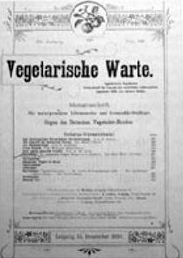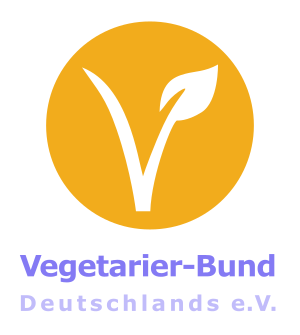ProVeg Deutschland facts for kids
| Founded | 1892 |
|---|---|
| Founder | Ernst Hering |
| Type | Non-governmental organisation |
| Focus | Nutrition, health, ecology and animal ethics |
| Location | |
| Origins | Vegetarierbund Deutschland, Leipzig |
|
Area served
|
Germany |
| Method | Information, support, campaigns |
|
Members
|
c. 14,000 |
|
Director
|
Sebastian Joy |
|
President
|
Thomas Schönberger |
| Affiliations | ProVeg International ProVeg Nederland European Vegetarian Union |
| Website | proveg.com/de |
ProVeg Deutschland is a German non-profit group that encourages people to eat fewer animal products. A non-profit group, also called a non-governmental organisation (NGO), is a team that works to help a cause, not to make money. The group was once called the German Vegetarian Association (or Vegetarierbund Deutschland in German).
ProVeg Deutschland is part of a bigger group called ProVeg International, which has similar teams in other countries. The main office for the German group is in Berlin. By 2015, it had about 14,000 members, making it the largest group for vegetarians and vegans in Germany. It is also a member of the European Vegetarian Union (EVU).
Contents
What Are ProVeg's Goals?
ProVeg Deutschland wants to help create a better future for people, animals, and the planet. They believe this can be done through the food we eat and how we farm.
Main Aims of the Group
- Promote Plant-Based Diets: They encourage people to try vegetarian or vegan diets. A vegetarian diet avoids meat, while a vegan diet avoids all animal products, like milk and eggs.
- Help Animals: They want to spread awareness about animal welfare and work to get better laws to protect animals.
- Protect the Planet: They share scientific facts about how eating less meat can help fight climate change and reduce pollution.
- Solve World Hunger: The group teaches people how plant-based diets can help feed more people around the world in a sustainable way.
The History of ProVeg Deutschland
The vegetarian movement in Germany started a long time ago, back in the 19th century.
Early Beginnings
In 1867, a man named Eduard Baltzer started the "German Association for a Natural Lifestyle." Many other vegetarian groups followed. On June 7, 1892, several of these groups joined together in the city of Leipzig to form the "German Vegetarian League." Their goal was to get people in Germany to eat less meat to improve health and the environment.
A Difficult Time
In the 1930s, the government in Germany made it very difficult for groups like this to exist. The vegetarian group was forced to shut down in 1935.
Starting Over After the War
After the Second World War ended, people wanted to restart the group in 1946. But because Germany was divided into different zones, it was hard. Two separate vegetarian groups were formed. They published a new magazine called Der Vegetarier ("The Vegetarian") in 1956. Over time, many local branches opened across West Germany.
Becoming ProVeg
In 1973, the group merged with another and got a very long name. To make it simpler, they started calling it VEBU. In 2008, this became its official name.
Finally, on April 22, 2017, the members decided to change the name one last time to ProVeg Deutschland. This showed it was now part of the worldwide ProVeg International family.
How Membership Grew
For many years, the number of members stayed about the same. But after 2008, the group started to grow very quickly. This happened because more people joined and because another vegetarian group from Stuttgart joined with them in 2012.
| Year | Membership |
|---|---|
| 2008 | 2,500 |
| 2009 | 2,800 |
| 2010 | 3,400 |
| 2011 | 4,800 |
| 2012 | 7,000 |
| 2013 | 10,000 |
| 2014 | 12,000 |
| 2015 | 14,000 |
| 2017 | 14,000 |
How the Group is Funded
ProVeg Deutschland gets its money from a few different places. The main sources are membership fees, donations from people who support their work, and money from licensing the V-Label. The V-Label is a special symbol put on food products to show they are vegetarian or vegan.
The group is also very open about how it spends its money. Since 2014, it has been part of an initiative that requires it to be transparent about its staff and finances.
What Does ProVeg Do?
ProVeg Deutschland is very active in Germany. They run many campaigns and projects to spread their message.
The V-Label
The group is in charge of the V-Label in Germany. This is a trusted symbol that helps shoppers easily find vegetarian and vegan products in the supermarket. Many stores, like Aldi-Süd, use the V-Label on their products.
Fun Campaigns
ProVeg has created several campaigns to get people excited about plant-based food.
- Veggieday: This campaign encourages restaurants and school or work cafeterias to offer tasty vegetarian and vegan meals, especially on Thursdays.
- Vegan Bake Sale: Every year, they ask people to join a worldwide event by baking and selling vegan cakes to raise awareness.
Information and Media
To reach as many people as possible, ProVeg uses different types of media. They publish a magazine called ProVeg Magazin and have a smartphone app that helps you find veggie-friendly restaurants nearby. They also have a press office to talk to newspapers and TV stations.
VeggieWorld Fair
ProVeg helped start VeggieWorld, which is now Europe's largest fair for the vegan lifestyle. The first one was in 2011. Thousands of people come to see new vegan products, listen to talks, and meet famous people who support a plant-based diet.
A Clever Campaign About Pets
In 2016, ProVeg ran a surprising campaign to make people think about why we eat some animals but not others. They created a website for a fake Swiss restaurant called La Table Suisse that claimed to serve cat and dog meat.
News of the restaurant spread online, and many people were very upset. After the story got attention in over 25 countries, ProVeg revealed it was all a setup. The campaign was designed to start a conversation about carnism, a term created by psychologist Melanie Joy to describe the belief system that makes people eat certain animals.
See also
- List of vegetarian and vegan organizations
 | Isaac Myers |
 | D. Hamilton Jackson |
 | A. Philip Randolph |



